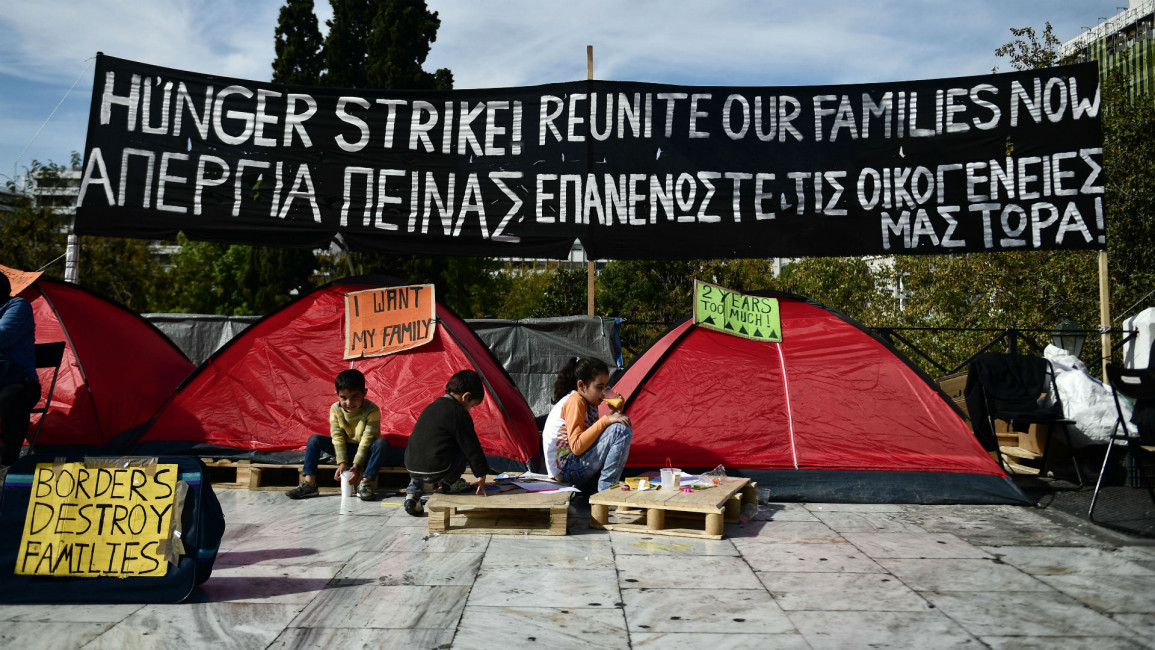Syrians end two-week hunger strike in Athens
Fourteen Syrian refugees who launched a hunger strike in Athens over the plight of families waiting to be reunited in Germany ended their two-week protest on Tuesday.
The protesters - seven women and seven men - came out of the tents they had pitched in front of the Greek parliament at midday, after receiving assurances during a visit by the German consul and an official from the Greek migration ministry, protest organiser Yiorgos Maniatis said at a press conference.
The Berlin official gave a guarantee they would be accepted in Germany once the six-month maximum delay between a request and transfer - set by European rules - was exceeded.
Three of the refugees have since received the green light to travel to Germany.
However, as well as demanding the acceleration of their own cases, they also called for the six-month waiting limit for Syrian refugees to be respected following reports of a deliberate slow-down.
In total, the deadline has been exceeded for around 2,500 refugees stranded in Greece, according to Maniatis.
"Our request was accepted eight months ago, but nothing has moved," one of the refugees, Zamila, told AFP.
Having arrived in Greece nearly two years ago, Zamila is waiting with her husband and her 16-year-old son to join her four other children, aged 15 to 24, who have been living in Kiel in northern Germany, since October 2015.
In May, Greek press reported that Athens and Berlin had reached an informal agreement to slow down the transfers ahead of the elections in Germany to around 80 per month.
Greek and German officials blamed the delays on bureaucratic difficulties and the pace picked up, with more than 350 departures in November, Maniatis said.
According to the UN High Commissioner for Refugees, Greece has registered some 9,300 applications for reunification this year, and 5,000 have been approved so far.
At the launch of the protest, the Athens municipality, held by the centre-left opposition, blamed the government for creating the problem by resorting to a "hidden bilateral agreement" with Germany.
Greece has seen a spike in arrivals of migrants and refugees in recent months - rising to an average rate of 200 per day, according to the government.
Greece's government says an agreement last year between the European Union and Turkey to combat migrant trafficking is not in danger of collapsing, despite a strain in relations between the EU and Ankara.
Migrants who arrived on Greek islands after that agreement took effect in March 2016 are not allowed to travel to the mainland before their asylum claim has been examined - causing serious overcrowding at government-run camps.
"What's happening is that the EU-Turkey deal is only being half implemented, because the part that involves migrants being returned to Turkey is not happening," Chios Mayor Michalis Vournous told a parliamentary committee briefing in Athens earlier this month.
Vournous and other Greek island mayors said the government and the EU have delayed promised assistance to deal with the rising numbers of migrants.
"The situation must be alleviated on the islands for the sake of the local economy and local society. Island life needs to return to normal," he said.


![The White House Correspondents' dinner is seeing renewed scrutiny amid Israel's war in Gaza. [Brooke Anderson/The New Arab]](/sites/default/files/styles/image_330x185/public/2024-04/IMG_5497.jpg?h=71976bb4&itok=iSygAqbR)